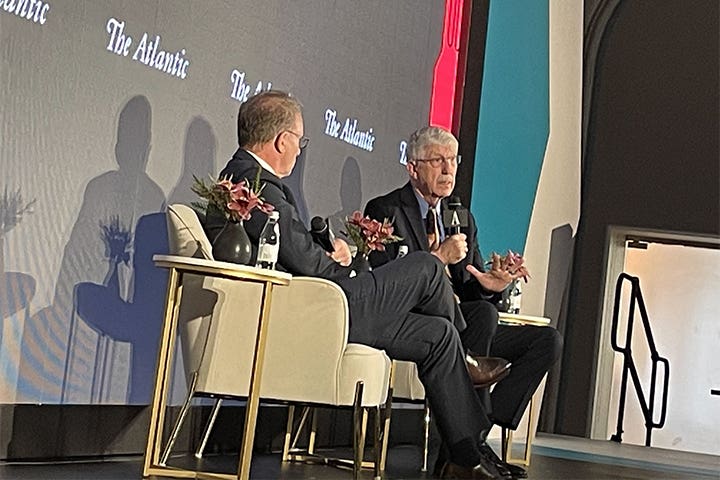WASHINGTON — “When you mix politics and science, you just get politics.”
Former NIH director Francis Collins, MD, PhD, made that comment Tuesday at an event here sponsored by The Atlantic as he reflected on the lessons he learned from his early experiences during the COVID pandemic. And although the country’s political polarization became more evident during that time, the seeds were sown even earlier, during the Obama administration, Collins said.
In the beginning of his tenure as NIH director, and even before that, when Collins was running the Human Genome Project, “the relationships I had … were every bit as intense and cordial and meaningful and substantive with both parties,” he said. “There was really no distinction, because everybody wanted to see progress made in finding answers to cancer and Alzheimer’s disease and whatever concern they had for themselves and their family, so it was at the point where you could walk into those discussions and forget which party you were talking to, and you could have a hearing about medical research, and it’d be substantive.”
But things started to change during the Obama years, Collins continued. “Certainly by the time we got to the elections of 2016, it was pretty clear that what used to be arguments about priorities and policies started to get much more personal. I think it’s a trend that was gradually happening, mostly driven by kind of mean-spirited politics that aimed not just to say, ‘Those people who don’t agree with me are misguided’ [but instead saying] ‘They’re dangerous; maybe they’re evil, and I don’t want to talk to them anymore.'”
Social media’s popularity also played a part, he said, “because what spreads on social media, as you well know, is not valuable, well-framed facts about how things work. It’s stuff that makes you mad and makes you want to do something to hurt those other bad people, or say something terrible.”

Collins also reflected on his own role during the early days of the pandemic in the loss of the public’s trust in the public health system. “It was a combination of judgment errors, which are easier to see in retrospect than when you’re in the middle of an emergency,” he said. When he talked to the public about how to avoid COVID, “I wish every time I had said, ‘We are still learning about this virus; there’s a whole lot we don’t understand. I’m going to tell you the best information that the experts have got, but it might be wrong. We might have to change it in a couple of weeks when we get more data.'”
But Collins said he and his colleagues didn’t do that because they were trying to motivate people to save their lives, so they wanted to be definitive about what the public should do. “But if [our advice] changed a month later, people began to wonder, ‘Do these guys know what they’re talking about?'” he said. “And we began to lose trust as a consequence of that, especially as politics got into this.”
He added that he was especially saddened that so many people died as a result of not being vaccinated for COVID. “The Kaiser Family Foundation estimates that from June 2021 through March of 2022, 234,000 Americans died unnecessarily … That’s like three jumbo jets crashing every day for 9 months. That is the most unbelievably heartbreaking story, and that happened in the United States of America because politics and science got all tangled up.”
At another session during the event, two state health secretaries discussed how public trust could be regained. “I do think it’s incumbent on all of us to really reach out and meet people where they are,” said Meena Seshamani, MD, PhD, secretary of the Maryland Department of Health and former director of the Center for Medicare during the Biden administration. “It’s really important that we are all engaging locally, and I think that needs to continue, especially now with the measles outbreak — it is tragic that there are all of these deaths that are completely preventable” by vaccination.
“How do we reach people where they are in a way that can help them to understand what can help keep them healthy?” she said. “I think that is something that is … really incumbent on all of us, because at the end of the day, people do want to hear from their neighbor, from their community, because that’s where then they can get more tactical and real-life advice and support and information.”
“At the end of the day, medicine and healthcare is about people, and people get most of their advice that they trust from their personal doctor or caregiver, their nurse practitioner, whoever it is that they go to for their care, and that’s where the trust comes from,” said Valerie Arkoosh, MD, MPH, Pennsylvania’s secretary of human services. “We need to be bolstering our primary care systems; we need to make sure that everybody feels like they have healthcare professionals that they could go to and trust when they have a question about a vaccine or whether they should get their children vaccinated.”
-
Joyce Frieden oversees MedPage Today’s Washington coverage, including stories about Congress, the White House, the Supreme Court, healthcare trade associations, and federal agencies. She has 35 years of experience covering health policy. Follow
Please enable JavaScript to view the
